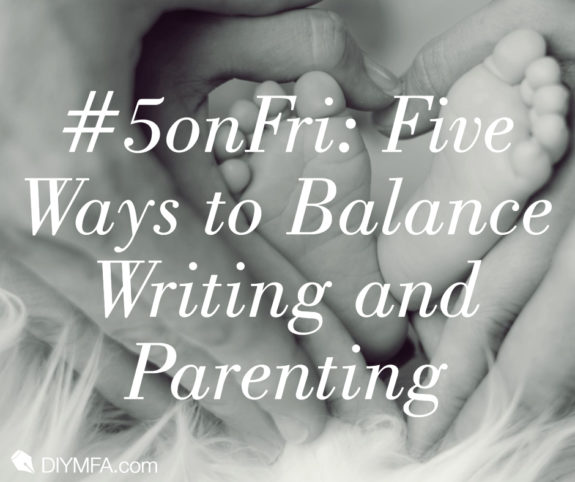After my son was born I had a moment of panic wondering if I’d ever be able to write again. Suddenly, my world began revolving around late-night feedings, diapering, and swaddling, which left me concerned about how my creativity would fare in this new reality. I’m four years into parenting now, and although my writing life has changed profoundly since becoming a mother, parenting has also offered some unexpected benefits. If you’re struggling to navigate raising kids while pursuing your writing projects, here are some ways to encourage these elements to coexist.
1) Double down on note taking
One of the unfortunate realities of writing while parenting is having less time to write. If we’re not diligent (and quick) ideas will fly through our brain before we have a chance to stop them. That’s why I’m not shy about using a variety of digital tools to keep me moving forward.
- Note apps: Many phones come with a standard note taking app, but my favorite is Simplenote. It’s free for both iPhone and Android users, and makes it easy to record any idea that comes to mind. You can use one note for everything—like a creative catchall—or create separate notes for various projects, such as blog posts, newsletters, poetry, or a book you’re writing.
- Google Docs: A few years ago I transitioned to saving all my writing files in Google Docs. It’s easy to create a folder structure that keeps you organized, but my favorite feature is that it’s available at my fingertips. After having a baby, focused time sitting at my computer has been few and far between. I often make more headway by opening the document of whatever project I’m working on and drafting a few sentences (or even a few paragraphs) right on my phone. When I do have some time to work more deeply, all my scattered notes and ideas are already there.
- Evernote: If you consume a lot of content online (but don’t always have time to read in-depth articles the second you come across them), Evernote is a great option for saving things you’d like to revisit. I especially like it when I’m doing research, but not ready to dive in to all my findings just yet.
2) Don’t stop experimenting
The thing about parenting—especially the first year—is things change quickly. One week your child is miraculously sleeping through the night, and another they wake up at 2 a.m, 4 a.m., and 6 a.m. I call these periods micro-seasons, when we’re forced to adapt to changing circumstances that don’t last very long in the grand scheme of things.
If you’re more comfortable with a predictable routine for your writing life, one of the best pieces of advice I can offer is to actively work to undo this mindset. Someone once asked me how I found time to write my second book while parenting and working full-time, and I said I adopted a “take what I can get” philosophy when it came to my writing time. Five minutes during a nap? I took notes on my phone. Twenty minutes while my husband pushed our son around the block? Computer on.
During the year my son nursed, I often typed on my phone with one hand, and I kept a notebook in the bottom of our stroller just in case I had an idea on one of our many afternoon walks. As he’s gotten older and our schedule has become more predictable, it’s been easier to commit to longer blocks of writing time, but my experimental mindset still stands.
3) Ask for help
It might not be the most comfortable thing to do, but asking for help is one of the best ways to ensure you get the support you need. Maybe it’s working out a childcare arrangement with your in-laws every other weekend, maybe your partner takes over the bedtime routine a couple of nights per week, or watches the kids on Saturday mornings so you can head to the local coffee shop. Whatever your writing goals, you’ll achieve them faster if you ask for what you need.
4) Leave the house
When it comes to doing the deep work required to finish something—from an article or blog post to an entire manuscript—I find sitting down in a new environment can help limit domestic distractions, of which there are many. Try a library on your lunch break, coffee shop on the weekends, or even a park. Just stay as far away as you can from dishes, laundry, homework, and the like.
5) Do less
I’m the last person who wanted to admit that doing less would actually help me make progress, but it’s true. When you’re navigating family life, work responsibilities, and dreaming up characters in your head or getting through the first draft of your memoir, it’s empowering to set aside things that are less important, at least temporarily.
When it came time to focus on my latest book’s manuscript, I said no to guest posting, freelance work, and blogging for about a year. I also watched less television at night and met up with friends less frequently. It was a series of intentional choices like this that ultimately paved the way for me to finish the project.
So long as you have young children and are also trying to write, you’ll have to make decisions about how to spend your time. This is a hard but reliable truth. Although, I’ve come to see parenting as a kind of compass for the writer’s life, because in forcing my hand to decide where to put my energy, it means the most important story that needs to be told will always rise to the surface.

Nicole Gulotta is the author of Wild Words: Rituals, Routines, and Rhythms for Braving the Writer’s Path and Eat This Poem: A Literary Feast of Recipes Inspired by Poetry. As the founder of the Wild Words community, she helps writers embrace the season they’re in, create at their own pace, and care for their minds and bodies along the way. She lives outside Raleigh, North Carolina with her husband and son.







